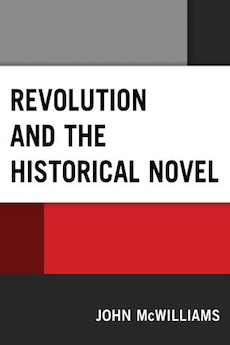By Benjamin Franklin Martin
John McWilliams (ΦBK, Princeton University, 1962), College Professor of Humanities, Emeritus at Middlebury College, argues that in the great historical novels “civil war, revolution, or counterrevolution is central to the narrative.” Their plots, from the first by Walter Scott and James Fenimore Cooper, through elaborations by Charles Dickens, Victor Hugo, Gustave Flaubert, Leo Tolstoy, Anatole France, Margaret Mitchell, Boris Pasternak, and Giuseppe Tomasi di Lampedusa, to the most recent by Gore Vidal, Gabriel Garcia Marquez, and Hilary Mantel, depict human behavior energized through the crisis of an Old Order desperately defending itself against collapse and a New Order brutally asserting its emergence.
Almost always, the protagonist wavers, torn between the old and the new, like Tolstoy’s Count Pierre Bezuhov (War and Peace), who admires Napoleon but loves his native Russia, like Pasternak’s Yurii Zhivago (Dr. Zhivago), who recognizes the failures of the tsars but deplores the ruthlessness of the Bolsheviks, like Mitchell’s Ashley Wilkes (Gone with the Wind), who understands the hollowness of antebellum southern values but is “as helpless as a turtle on his back” in the postwar South, like Lampedusa’s Don Fabrizio (The Leopard), who prefers old Sicily’s stultification to new Italy’s vulgarity.
Frequently, a physical “Neutral Ground” separates the old and new and is contested by both. Cooper’s The Spy first uses the term for Westchester Country in New York, where British and American paramilitary bands engage savagely. Scott’s Waverly describes the ruthless fighting in the Lowlands separating Scotland and England during the 1745 Jacobite rebellion. No one is safe from the Forest Brotherhood operating along the railroad line in Pasternak’s Dr. Zhivago.
So often, revolutions made in the name of liberty lead to autocracy and then autocracy to restoration of the old chains. As Dickens in A Tale of Two Cities, Hugo in 1793, and France in The Gods Will Have Blood make clear, the severities of the Terror are intended as an antidote to the inequities of the Bourbon Old Regime. In Dr. Zhivago, Pasternak lacerates the revolutionary lie that the Bolshevik slave labor camps are the revenge for tsarist repression. Similarly, in The Leopard, Lampedusa has no patience for the propaganda of Risorgimento. No wonder that Yurii Zhivago and Don Fabrizio die incapable of grasping how they have been betrayed by their time.
This admirably clear and approachable study encourages a rereading of these great historical novels for the perspectives they offer.
Benjamin Franklin Martin (ΦΒΚ, Davidson College, 1969) is Price Professor of History Emeritus, Louisiana State University.




